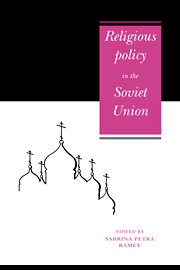Book contents
- Frontmatter
- Contents
- Notes on contributors
- Preface
- Part I Introduction
- Part II Policy apparatus
- 3 The Council for Religious Affairs
- 4 Some reflections about religious policy under Kharchev
- 5 The state, the church, and the oikumene: the Russian Orthodox Church and the World Council of Churches, 1948–1985
- Part III Education, socialisation, and values
- Part IV Cults and sects
- Part V The world of Christianity
- APPENDIX: Religious groups numbering 2,000 or more, in the USSR
- Index
4 - Some reflections about religious policy under Kharchev
Published online by Cambridge University Press: 03 December 2009
- Frontmatter
- Contents
- Notes on contributors
- Preface
- Part I Introduction
- Part II Policy apparatus
- 3 The Council for Religious Affairs
- 4 Some reflections about religious policy under Kharchev
- 5 The state, the church, and the oikumene: the Russian Orthodox Church and the World Council of Churches, 1948–1985
- Part III Education, socialisation, and values
- Part IV Cults and sects
- Part V The world of Christianity
- APPENDIX: Religious groups numbering 2,000 or more, in the USSR
- Index
Summary
We learned more during 1989 about the processes governing the formulation of religious policy in the USSR than for decades previously. A number of frank statements in sections of the Soviet press, above all those by Konstantin Kharchev, the former chairman (until June 1989) of the Council for Religious Affairs under the Council of Ministers of the USSR (CRA) provided an insight into the numbers of party and government bodies involved with religious policy and the rivalries which beset them. In fact, so far as the available evidence suggests, this has always been the case throughout the Soviet period. Policy on religion (as on other matters) appears to have evolved through the intervention of bodies with different interests, through factional struggle and through personal conviction, rather than from any clear, consistent policy developed by the CPSU. Trotsky in the early 1920s and Khrushchev in the early 1960s are both examples of the latter factor, as Philip Walters suggests in his chapter (pp. 9–11, 19–20). The infighting and obstructiveness revealed by Kharchev simply means that, in the age of glasnost, such struggles can no longer take place entirely behind closed doors.
Kharchev's disclosures came chiefly in a series of three increasingly frank interviews in the weekly magazine Ogonëk with journalist Aleksandr Nezhny, who made no secret of his own sympathy for the rights of believers. It transpired that Kharchev gave the first of these interviews, in May 1988, when he already knew that his position at the CRA was in jeopardy because of the opposition he was encountering from other bodies.
- Type
- Chapter
- Information
- Religious Policy in the Soviet Union , pp. 84 - 104Publisher: Cambridge University PressPrint publication year: 1992



